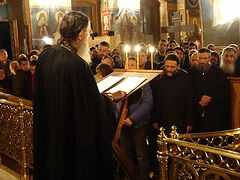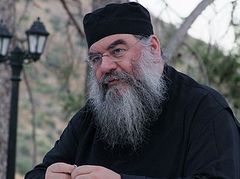 Your attitude towards fasting is one of the criteria for evaluating your faith.
Your attitude towards fasting is one of the criteria for evaluating your faith.
Of course, it is true that you are not your own judge. We cannot give a fair self-assessment or an assessment of our neighbor. Therefore, thorough, true judgment of us belongs to God alone, and we were commanded: Judge not (Matt. 7:1). But our attitude towards fasting is still a criterion of whether we love the Church as a mother or not, whether we have experienced the benefits of abstinence or not, whether we cling to worldly customs or value our inner freedom—all this is manifested in our attitude towards fasting.
A train in which a young lady is traveling from afar to her beloved boyfriend has not pulled into the station yet, but the fellow is already walking to and fro on the platform, looking at his watch. His heart now misses a beat, now suddenly beats very, very fast in his chest. The young man is waiting. His state is called longing, a foretaste and anticipation of happiness. You should greet Lent in the same state.
The spring of the soul, the labor of cleansing undertaken for the sake of a worthy Paschal celebration—that is what fasting is. It is self-crucifixion, the voluntary mortification of your proud and crafty being for the sake of participation in the Resurrection of Christ. And they that are Christ’s have crucified the flesh with the affections and lusts (Gal. 5:24).
To approach Lent with a feeling of increasing inner joy means to feel the fragrance of the Paschal triumphant cry: “Christ is Risen!”, and to strive consciously for the Paradise from where this fragrance pours forth. Because of the savour of Thy good ointments Thy name is as ointment poured forth (Cant. 1:2).
A civilization that grew out of Christianity and received the prefix “post-” is a civilization corroded by individualism. The attitude towards everything in the world is determined by our “personal choice” and “private opinion”. “I want it that way”, and “I think so,” people say on any occasion. Strangely enough, in such conditions people have less and less ability to make well thought-out personal judgments. They think the same things more and more often, because they get information from the same TV programs. The triumph of individualism actually leads to the triumph of monotony and inexpressiveness. In relation to religion, this dull amorphousness hides behind commonplaces like, “Don’t mess with my soul”, “Faith is a personal matter for everyone”, and so on.
Why do we touch upon these subjects in talking about fasting? Because the Truth exists objectively, and if that so, then it must be served. A believer strives to serve the incarnate Truth, Christ, while people around him keep singing him the same song, although to different melodies: “There is no Truth”; “Religion is a private matter”; “Every man to his own taste”; and the like. Behind these songs lies only one motive: “Have a lot of fun!”, and the same demonic prayer: “My will be done.” In such conditions, a believer is called to battle by his very life and confession of the faith. The visor has been lowered, his name has been announced, the drums have started beating, and the stands have frozen.
It goes without saying that although we are all called to battle, not all of us are soldiers at heart. Where can we look for a way out and a solution to the conflict? In a sense of conciliarity!
We should warm up and cultivate a sense of belonging to the Universal Church in our hearts. No matter how few people are fasting and praying around us, we are nevertheless fasting together and simultaneously with millions of believers. The Creed that I profess is not a personal one that I have composed. This is the faith of the Apostolic Church, the faith in which millions of souls have already been saved and millions more are being saved. The great feasts that we celebrate concern not only those whom we see around us in church, but also multitudes of people singing the praises of the Lord in different languages simultaneously. The same applies to Lent. You do not fast for your personal whims, but for Christ’s sake. You don't fast when you want to, but when the Church blesses you to. You don’t fast alone, but together with a great many brothers and sisters, whose invisible labors strengthen your weak soul in loneliness.
The sense of conciliarity is that of connection with the Church scattered on the Earth and with the general assembly and Church of the firstborn, which are written in Heaven (Heb. 12:23). And if so, then everything is much calmer and more joyful than it seems at first glance at the sight of vulgarity in everyday life.
We can pray: “Lord Jesus Christ, through the prayers of all those who repent before Thee, accept my repentance”; “Through the prayers of all those who fast sincerely and humble their hearts before Thee, teach me to fast too.”
In this way we will enter into spiritual contact not just with those whom we habitually call “brothers and sisters”, but with real brothers and sisters in the spirit of prayer and repentance, with real kin of a large church family.
We can and should pray not only for mercy for ourselves through their prayers, but also ask the Lord, Lord, accept all those who turn their hearts to Thee. Listen to people’s entreaties and petitions. Forgive the sins of all who weep over their sins.” Since the prayer of faith is never in vain, we will support at least one soul if only for a moment in this way.
Such prayers are true conciliarity and a real victory over petty egoism and moldy individualism, which have stuck in the minds of our contemporaries like the haunting melody of a vulgar smash hit. They are similar to the prayers that are offered up on Saturday on the eve of Forgiveness Sunday. On this day the Church commemorates all the men and women who have attained true holiness through fasting and prayer. These are the monastic fathers and mothers and the holy “fools-for-Christ”. The Church seeks to secure their prayerful help so that those who put the devil to shame with the weapon of fasting can help us in a similar struggle.
So, none of us are lone warriors. On the contrary, each one of us must take his place in the ranks of a disciplined army, obedient to the commander (even if each individual warrior is far from a “universal soldier”). Such an army, in whose ranks every fighter is a brave man and a hero, will always defeat the enemy. But there is no general discipline and unity in it.
A sense of spiritual fellowship and a sense of belonging to the great host, led by Jesus Christ, Who is Risen from the Dead, will be able to turn our personal weakness into conciliar power. And what has been impossible to change in your feeble soul for years before fasting and without fasting will be changed by the power of grace bestowed by God on the fasting Church.
So go forward, warriors of Christ, to meet the Risen One! “Behold, through the Cross joy hath come to all the world”! Go forward, strengthening and encouraging each other, and don’t show your back to the enemy! Let us mentally add three words to the Creed for the period of Lent: “I believe in one Holy, Catholic, which has entered into the feat of fasting, and Apostolic Church!”



